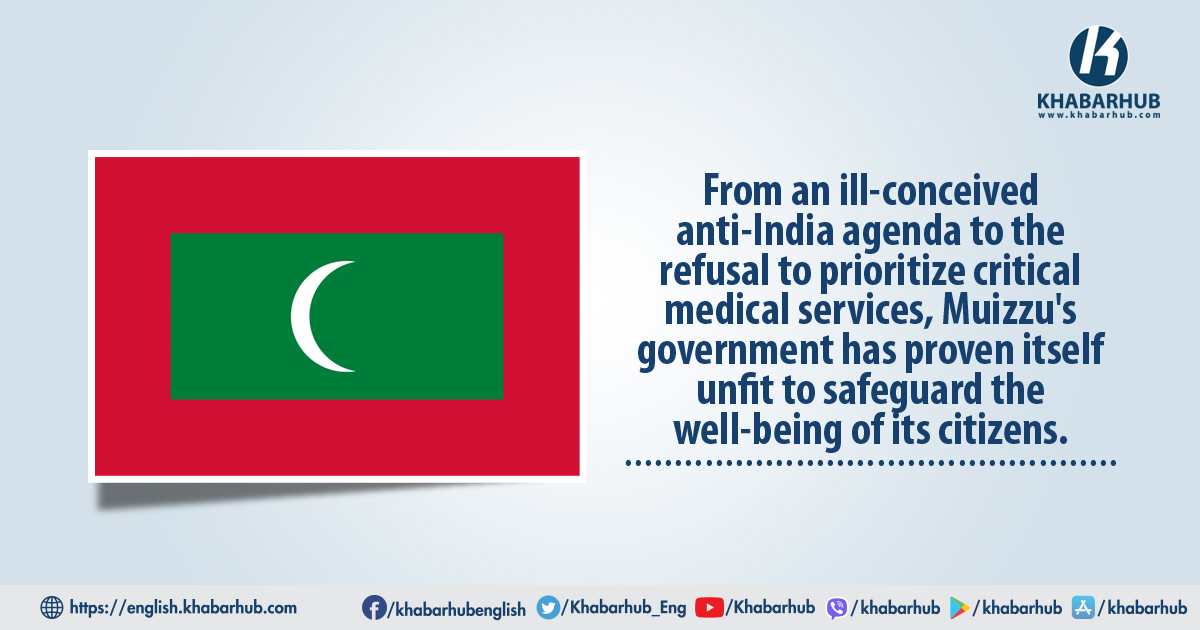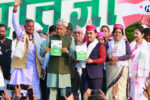In the wake of a heart-wrenching incident on the remote island of Villingili, the Maldives is not only mourning the loss of a young life but also grappling with the far-reaching consequences of President Mohamed Muizzu’s government’s poor decisions.
The tragic death of 13-year-old Mohamed Jaah Khalid serves as a stark reminder of the detrimental impact of President Muizzu’s misguided policies, particularly his anti-India stance and the callous refusal to utilize critical resources during medical emergencies.
The premature loss on the secluded island of Villingili serves as a poignant reminder of the profound consequences stemming from President Mohamed Muizzu’s government’s ill-fated decisions.
Beyond individual sorrow, this heart-wrenching incident underscores the alarming implications of a leadership that prioritizes political posturing over the fundamental duty of safeguarding its citizens.
The failed medical evacuation of Khalid exposes a government seemingly more invested in political maneuvering than in preserving lives, raising questions about priorities and competence.
The distressing saga began when Khalid, afflicted with a brain tumor, desperately required swift medical attention.
The family’s plea for emergency evacuation to Malé, where advanced medical treatment awaited, was met with a series of unfortunate events.
This arbitrary deadline, coupled with the refusal to utilize Indian helicopters during medical emergencies, reveals a government more interested in scoring political points than safeguarding the well-being of its citizens.
Technical glitches in the aircraft meant for medical evacuation and the government’s obstinate refusal to deploy available Indian resources led to a heart-wrenching outcome.
Muizzu’s government chose political posturing over a child’s life, a decision that raises serious questions about its priorities and competence.
At the core of this unfolding tragedy lies President Muizzu’s persistent anti-India stance, a position that has steadily eroded diplomatic ties with India.
From opposing his predecessor’s ‘India First’ policy during his election campaign to promptly demanding the withdrawal of Indian military personnel upon assuming office, Muizzu has set the stage for a profound diplomatic rift, evident in compromised critical services such as medical evacuation.
Further exacerbating the situation is Muizzu’s apparent alignment with China for perceived monetary benefits, a move that raises the specter of falling into a potential debt trap.
While the short-term gains may seem enticing, the long-term consequences, including economic dependencies and compromised sovereignty, pose a significant threat to the Maldives’ stability.
As Muizzu navigates this perilous course, the nation stands at the crossroads of diplomatic turmoil and economic vulnerability, highlighting the pressing need for a reconsideration of political allegiances in the pursuit of sustainable national well-being.
The Maldives’ insistence on a March 15 deadline for the withdrawal of Indian military personnel has not only escalated tensions but also brought about a diplomatic stalemate.
Domestically, there has been a groundswell of outrage and condemnation, with opposition leaders, including Meekail Naseem, pointing fingers at Muizzu for prioritizing political animosity over the lives of Maldivian citizens.
India has stepped forward to resolve the matter by formation of a high-level core committee established jointly by the Maldives and India.
However, despite acknowledging India’s crucial role in humanitarian and medical assistance, Muizzu’s government remains obstinate.
This arbitrary deadline, coupled with the refusal to utilize Indian helicopters during medical emergencies, reveals a government more interested in scoring political points than safeguarding the well-being of its citizens.
Muizzu’s pivot towards China, evident in strategic cooperation agreements and an ‘India Out’ campaign, poses significant risks to the region’s stability.
The growing influence of China, coupled with the Maldives’ strategic alignment, not only undermines historical ties with India but also jeopardizes the delicate geopolitical balance.
Muizzu’s shortsighted pursuit of minuscule monetary gains from China may have severe consequences for the Maldives and its people.
Collaborative dialogue with India to find mutually beneficial solutions, especially in maintaining crucial humanitarian and medical services, should take precedence over political posturing.
The international community, particularly India, has responded cautiously to the Maldives’ demands.
However, Muizzu’s government seems unmoved by diplomatic concerns, further isolating the archipelago in its pursuit of questionable alliances.
Domestically, there has been a groundswell of outrage and condemnation, with opposition leaders, including Meekail Naseem, pointing fingers at Muizzu for prioritizing political animosity over the lives of Maldivian citizens.
At the center of this tragedy lies the palpable failure of Muizzu’s government to prioritize the lives of its citizens over political maneuvering.
The refusal to use Indian helicopters during critical medical evacuations, leading to the untimely death of a young boy, showcases a shocking lack of compassion and foresight.
Muizzu’s decisions have not only strained diplomatic ties but have also placed the Maldives in a precarious position on the global stage.
While Muizzu’s government may be fixated on the March 15 deadline and an ‘India Out’ agenda, a more pragmatic approach is necessary.
As the Maldives grapples with the aftermath of this heart-wrenching incident, it is imperative that the nation reevaluates its leadership’s priorities and seeks a path that prioritizes the lives and welfare of its people over misguided political posturing.
Collaborative dialogue with India to find mutually beneficial solutions, especially in maintaining crucial humanitarian and medical services, should take precedence over political posturing.
The Maldives must reassess the real costs of aligning with China, considering the potential long-term implications for the nation and its people.
As the Maldives grapples with the aftermath of this heart-wrenching incident, it is imperative to hold President Muizzu’s government accountable for its poor decision-making.
The refusal to prioritize critical medical services, the arbitrary March 15 deadline, and the reckless pursuit of an ‘India Out’ agenda demand scrutiny.
Leadership, in times of crisis, requires a commitment to the well-being of citizens above all else.
The tragedy of Mohamed Jaah Khalid’s death has laid bare the consequences of President Muizzu’s reckless decision-making.
From an ill-conceived anti-India agenda to the refusal to prioritize critical medical services, Muizzu’s government has proven itself unfit to safeguard the well-being of its citizens.
As the Maldives grapples with the aftermath of this heart-wrenching incident, it is imperative that the nation reevaluates its leadership’s priorities and seeks a path that prioritizes the lives and welfare of its people over misguided political posturing.
The Maldives deserves leadership that acts in the best interests of its citizens, even in the face of diplomatic challenges.








Comment